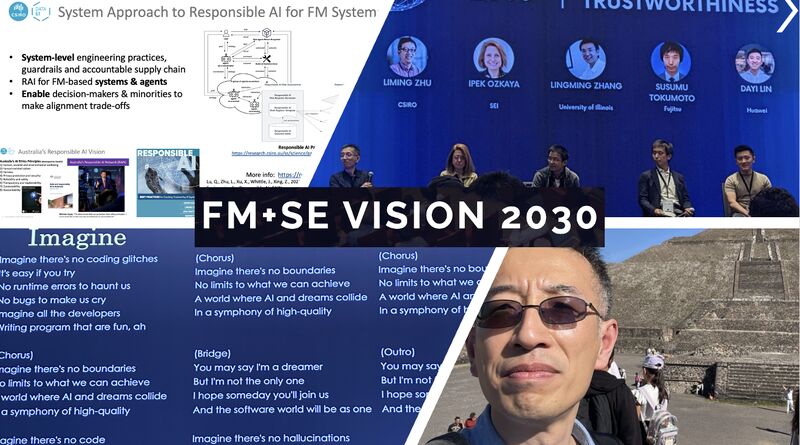I am often asked, “𝐼𝑛 𝑡ℎ𝑖𝑠 𝐶ℎ𝑎𝑡𝐺𝑃𝑇 𝑒𝑟𝑎, 𝑖𝑠 𝑙𝑒𝑎𝑟𝑛𝑖𝑛𝑔 𝑡𝑜 𝑐𝑜𝑑𝑒 𝑠𝑡𝑖𝑙𝑙 𝑒𝑠𝑠𝑒𝑛𝑡𝑖𝑎𝑙 𝑓𝑜𝑟 𝑜𝑢𝑟 𝑐ℎ𝑖𝑙𝑑𝑟𝑒𝑛?”
Powerful Foundation Models (FM) not only write increasingly sophisticated code, but they also perform a growing range of functions within the trained blackbox model, where no traditional code is ever written. My answer was finally put to the test at a 4-day exclusive, invitation-only event in Mexico City, featuring leaders from FM companies like Google and Microsoft, along with top software engineering researchers. Our focus? To envision the radically changing landscape of software engineering. Here’s a glimpse into the scenarios we explored:
1. 𝐂𝐨𝐝𝐞𝐥𝐞𝐬𝐬 𝐅𝐮𝐭𝐮𝐫𝐞: Imagine a world with almost no code-derived software. Foundation Models (FMs) provide learned/trained functionalities within the model, safeguarded by human-understandable guardrails and assurance written in code.
2. 𝐅𝐌-𝐃𝐫𝐢𝐯𝐞𝐧 𝐃𝐞𝐯𝐞𝐥𝐨𝐩𝐦𝐞𝐧𝐭: Here, FMs lead in generating, reviewing, and testing most code. Human developers intervene for critical tasks like understanding context, resolving ambiguities, and debugging, supported by AI assistants. The focus shifts from code to higher-level abstractions – certainly beyond prompts to AI-assisted creation of design documents/specs and multi-modal inputs.
3. 𝐂𝐨𝐥𝐥𝐚𝐛𝐨𝐫𝐚𝐭𝐢𝐯𝐞 𝐀𝐮𝐭𝐨𝐧𝐨𝐦𝐲: FMs evolve into autonomous agents, coding in tandem with humans and other agents. While human developers remain vital, their roles and the software development process undergo profound transformation.
4. 𝐀𝐈 𝐦𝐞𝐫𝐞𝐥𝐲 𝐚𝐬 𝐂𝐨-𝐏𝐢𝐥𝐨𝐭: In this scenario, FMs serve as copilots, drafting initial code and assisting with reviews and tests. Human developers’ productivity soars, yet the essence of software development remains largely unchanged.
Our dialogue transcended the question of ‘if’ to ‘when’. We delved into the evolving roles of software engineering, and the paramount importance of trustworthiness and safety in this new era. I shared insights in my talk and panel discussion on the importance of system-level guardrails, engineering practices, design patterns and supply chain accountability.
Insights from companies training and employing FMs in coding illuminated both the opportunities and challenges ahead.
This was, without a doubt, one of the most exhilarating discussions in the software engineering community recently. We unanimously agree: FMs aren’t the end of software engineering; they mark the beginning of a radically different paradigm. A new community and mindset are emerging, and we, including our next generation, are all part of this transformative journey.
Find more info on our research on the topic here.
𝐑𝐞𝐬𝐞𝐚𝐫𝐜𝐡 at CSIRO’s Data61: https://lnkd.in/gyzjE4-i
National AI Centre: https://lnkd.in/gzqzZex3
𝐁𝐨𝐨𝐤: https://lnkd.in/gsQz5swy

